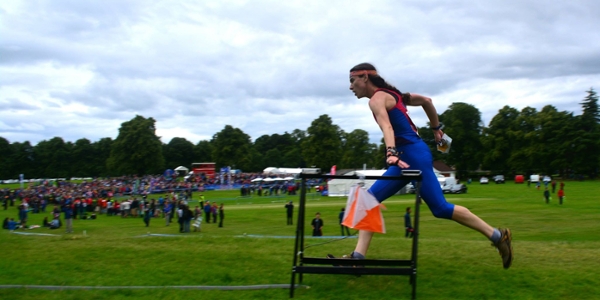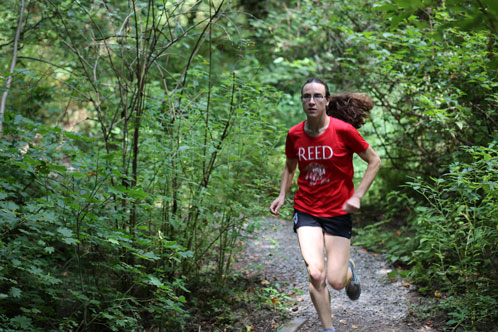
IRIS login | Reed College home Volume 96, No. 2: June 2017
Reed Astrophysicist is Orienteering Star

ANGULAR MOMENTUM. Prof. Alison Crocker blasts through the finish line in women's sprint final at the World Orienteering Championships in Inverness, Scotland. Ethan Childs
Prof. Alison Crocker [physics 2014–] came in 15th in the women’s sprint final at the 2015 World Orienteering Championships, the best individual result ever achieved by a US orienteer at the world level.
Prof. Crocker’s shining performance came despite an initial stumble, when she misread the map and found herself on the wrong side of a stone wall, losing roughly 20 seconds. “Not a perfect race, but I was feisty after an early mistake and that did the job!” she wrote on Facebook after the race.

SETTING HER SIGHTS. Prof. Crocker runs in the Reed Canyon before representing the USA in the World Orienteering Championships. Tom Humphrey
Prof. Crocker came in 15th in the sprint, 45th in the long distance, and was one of three runners in the US women’s relay team, which came in 20th. The events were held July 31–August 7 in Inverness, Scotland.
The sport of orienteering combines map reading, running, and not getting lost. Competitors have to find their way between a series of checkpoints, called controls, as quickly as possible and in the right order. Orienteers do not see the map of the course until the race starts, so there can be no advance planning of routes or control locations.
By day (or is it night?) Prof. Crocker is an astrophysicist who studies the cold gas and dust within nearby galaxies to learn more about how stars are formed. She earned a PhD in astrophysics from the University of Oxford and holds a bachelor degree in both physics and mathematics from Dartmouth.
At Reed she teaches astrophysics and general physics, and can be often seen (in a Doppler-shifted blur) running around the neighborhood with other Reed locomotorists.


LATEST COMMENTS
steve-jobs-1976 I knew Steve Jobs when he was on the second floor of Quincy. (Fall...
Utnapishtim - 2 weeks ago
Prof. Mason Drukman [political science 1964–70] This is gold, pure gold. God bless, Prof. Drukman.
puredog - 1 month ago
virginia-davis-1965 Such a good friend & compatriot in the day of Satyricon...
czarchasm - 4 months ago
John Peara Baba 1990 John died of a broken heart from losing his mom and then his...
kodachrome - 7 months ago
Carol Sawyer 1962 Who wrote this obit? I'm writing something about Carol Sawyer...
MsLaurie Pepper - 8 months ago
William W. Wissman MAT 1969 ...and THREE sisters. Sabra, the oldest, Mary, the middle, and...
riclf - 10 months ago